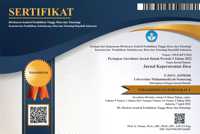DINAMIKA HUBUNGAN TANPA STATUS: ANTARA KEBEBASAN EMOSIONAL DAN KETIDAKJELASAN KOMITMEN
(1) Universitas Sumatera Utara
(*) Corresponding Author
Abstract
Fenomena hubungan tanpa status (HTS) semakin marak dalam dinamika relasi romantis modern. Individu yang memilih hubungan tanpa status sering kali menghadapi dilema antara kebebasan emosional dan ketidakjelasan komitmen. Penelitian ini bertujuan untuk memahami dan mengeksplorasi pengalaman individu yang menjalani hubungan tanpa status (HTS), khususnya dalam kaitannya dengan kebebasan emosional dan ketidakjelasan komitmen. Studi ini menggunakan pendekatan fenomenologi untuk mengeksplorasi pengalaman subjektif individu dalam hubungan tanpa status, dengan fokus pada motivasi, dinamika emosional, dan dampak psikososialnya. Data dikumpulkan melalui wawancara mendalam dengan partisipan yang memiliki pengalaman dalam hubungan tanpa status. Analisis tematik menunjukkan bahwa hubungan tanpa status menawarkan fleksibilitas emosional dan kebebasan dari tuntutan hubungan tradisional, tetapi juga menimbulkan ambiguitas dalam komitmen dan ketidakpastian emosional. Implikasi penelitian ini menyoroti perlunya pemahaman lebih lanjut terhadap perubahan pola relasi romantis dalam masyarakat modern.
Keywords
Full Text:
PDFReferences
Arnett, J. J. (2021). Emerging adulthood: The winding road from the late teens through the twenties (3rd ed.). Oxford University Press.
Bauman, Z. (2023). Liquid love: On the frailty of human bonds. Polity Press.
Bowlby, J. (2020). Attachment and loss: Vol. 1. Attachment (2nd ed.). Basic Books.
Dainton, M., & Aylor, B. (2020). Managing relational uncertainty in undefined romantic relationships. Personal Relationships, 27(1), 132-152. https://doi.org/10.1111/pere.12310
Festinger, L. (2021). A theory of cognitive dissonance: New insights and applications. Psychology Press.
Finkel, E. J., & Eastwick, P. W. (2021). Interpersonal attraction in the modern world: The impact of relationship flexibility. Annual Review of Psychology, 72, 245-271. https://doi.org/10.1146/annurev-psych-010419-051104
Finkel, E. J., Simpson, J. A., & Eastwick, P. W. (2022). The psychology of close relationships: Social psychological perspectives. Oxford University Press.
Hazan, C., & Shaver, P. R. (2020). Attachment as an organizational framework for close relationships: Theoretical and empirical perspectives. Annual Review of Psychology, 71, 195-222. https://doi.org/10.1146/annurev-psych-010419-050827
Nurwela, T. S., & Israfil, I. (2022). Faktor-faktor yang berhubungan dengan stres pada remaja: Literatur review. Jurnal Keperawatan Jiwa, 5(2), 103-115.
Pew Research Center. (2022). Shifting trends in modern relationships: Young adults and the decline of traditional commitment. https://www.pewresearch.org/2022/modern-relationships
Ryan, R. M., & Deci, E. L. (2020). Intrinsic and extrinsic motivations: Classic definitions and new directions. Contemporary Educational Psychology, 61, 101860. https://doi.org/10.1016/j.cedpsych.2020.101860
Sarif, E., & Kurniawan, A. (2022). Kecemasan dengan perilaku self-harm pada remaja. Jurnal Keperawatan Jiwa, 5(2), 116-128.
Solomon, D. H., & Knobloch, L. K. (2023). Relational turbulence and uncertainty management in romantic relationships. Journal of Social and Personal Relationships, 40(3), 520-538. https://doi.org/10.1177/02654075221139876
Sprecher, S., & Treger, S. (2021). The uncertain nature of non-traditional romantic relationships: A review and future directions. Journal of Social and Personal Relationships, 38(4), 999-1023. https://doi.org/10.1177/0265407521997928
Article Metrics
Abstract view : 608 timesPDF - 159 times
DOI: https://doi.org/10.26714/jkj.13.3.2025.521-528
Refbacks
- There are currently no refbacks.

This work is licensed under a Creative Commons Attribution 4.0 International License.
PPNI Univ. Muhammadiyah Semarang
Jl. Kedungmundu Raya No. 18 Semarang Gedung NRC University of Muhammadiyah Semarang
Phone: 02476740287
Fax: 02476740287
Email: jurkep.jiwa@gmail.com
This work is licensed under a Creative Commons Attribution 4.0 International License.

